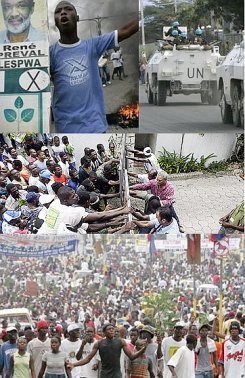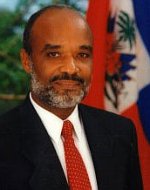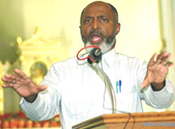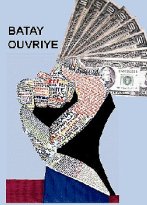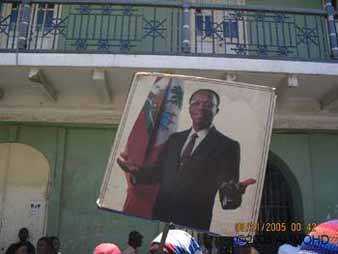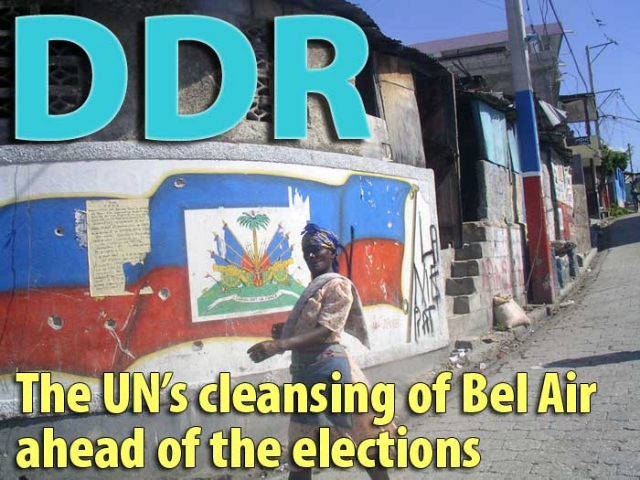Feature Archives
Tue Feb 14 2006
Attempt to Block Democracy in Haiti, Again
2/15/2006:
Former President Rene Preval said on Tuesday he won last week's election outright and urged Haitian elections officials to hold off publishing final election results because of possible fraud.
"We are sure of having won in the first round," Preval said in his first significant comments on the election results in the week since the vote
more
On Wednesday, vote monitors discovered piles and piles of burned and trashed ballots marked for Preval.
Executive Director of Haiti’s Provisional Electoral Council (CEP) Jacques Bernard, an appointee of ‘interim’ Prime Minister Gerard Latortue, indicated Saturday evening that the percentage of votes for Presidential candidate Rene Préval in the February 7 presidential elections was actually lower than originally estimated. This was due to the addition of 72,000 blank ballots. A spokesman for the electoral council said blank votes had not been counted in past elections, but these ballots were added to vote totals used to calculate each candidate's tally, effectively lowering each candidate's percentage of the overall vote and dropping the vote for Préval to less than 50 percent. If this stands, there will be a runoff vote, presumably pitting Préval against elite-backed Leslie Manigat, who only received around 12 percent of the vote.
Electoral council member Pierre Richard Duchemin said he was being denied his rightful access to information about the tabulation process and called for an investigation. Pointing to "a certain level of manipulation," Duchemin told The Associated Press, "there is an effort to stop people from asking questions." Dr. Frantz Large, a Senate candidate for Lespwa, Préval’s party, observed: "The first objective of the provisional authority is to force René Préval to a 2nd round, and run a coalition of candidates against him. "The second objective is to push the popular masses who have a legitimate beef, into the streets, inciting them to vent blind rage onto the « bord de mer » (dockside) in Port-au-Prince which houses stores and offices of all kinds, small businesses, fine victims making up the country’s working middle class. This would certainly lead to creating hate and resentment against President Préval, and a desire to find refuge in stifling policies that border on fascism."
Further fanning the flames of discontent amongst hundreds of thousands who have been subjected to unrelenting repression involving rape, extrajudicial execution and illegal imprisonment of dissidents since the February 2004 U.S.-backed ouster of the democratically-elected government of President Jean-Bertrand Aristide, the UN today again opened fire on demonstrators in Port-au-Prince. An anonymous UN official told a reporter that "several dozen" were injured.
Read More | Counting Some of the Votes in Haiti | Mass protests erupt over vote count | Haiti Democracy Project has U.S. Defense Dept Chief as an "election observer" | U.N. Troops Kill Haitian Democracy Demonstrators | Haiti's Poor Erupt in Protest | Préval supporters paralyze Haiti's capital, validity of elections in doubt | US troop deployment sparks protests in Dominican Republic
Executive Director of Haiti’s Provisional Electoral Council (CEP) Jacques Bernard, an appointee of ‘interim’ Prime Minister Gerard Latortue, indicated Saturday evening that the percentage of votes for Presidential candidate Rene Préval in the February 7 presidential elections was actually lower than originally estimated. This was due to the addition of 72,000 blank ballots. A spokesman for the electoral council said blank votes had not been counted in past elections, but these ballots were added to vote totals used to calculate each candidate's tally, effectively lowering each candidate's percentage of the overall vote and dropping the vote for Préval to less than 50 percent. If this stands, there will be a runoff vote, presumably pitting Préval against elite-backed Leslie Manigat, who only received around 12 percent of the vote.
Electoral council member Pierre Richard Duchemin said he was being denied his rightful access to information about the tabulation process and called for an investigation. Pointing to "a certain level of manipulation," Duchemin told The Associated Press, "there is an effort to stop people from asking questions." Dr. Frantz Large, a Senate candidate for Lespwa, Préval’s party, observed: "The first objective of the provisional authority is to force René Préval to a 2nd round, and run a coalition of candidates against him. "The second objective is to push the popular masses who have a legitimate beef, into the streets, inciting them to vent blind rage onto the « bord de mer » (dockside) in Port-au-Prince which houses stores and offices of all kinds, small businesses, fine victims making up the country’s working middle class. This would certainly lead to creating hate and resentment against President Préval, and a desire to find refuge in stifling policies that border on fascism."
Further fanning the flames of discontent amongst hundreds of thousands who have been subjected to unrelenting repression involving rape, extrajudicial execution and illegal imprisonment of dissidents since the February 2004 U.S.-backed ouster of the democratically-elected government of President Jean-Bertrand Aristide, the UN today again opened fire on demonstrators in Port-au-Prince. An anonymous UN official told a reporter that "several dozen" were injured.
Read More | Counting Some of the Votes in Haiti | Mass protests erupt over vote count | Haiti Democracy Project has U.S. Defense Dept Chief as an "election observer" | U.N. Troops Kill Haitian Democracy Demonstrators | Haiti's Poor Erupt in Protest | Préval supporters paralyze Haiti's capital, validity of elections in doubt | US troop deployment sparks protests in Dominican Republic
Tue Feb 7 2006
Haiti: Election Day and Beyond
2/8/2006:
Counting of ballots has started in Haiti after elections marked by stampedes that left four dead ended.
Voters were frustrated by voting stations opening late and other major problems, leading to crowds storming polling stations and voting continuing late into the night.
Mr Préval is the absolute favourite to win the battle for the presidency. He's already served in that office and was once the protégé of another - now exiled - former president, Jean-Bertrand Aristide. Although he's since distanced himself from Aristide, Mr Préval enjoys great popularity among exactly the same poor sections of Haiti's population.
Election results are not expected to be announced for at least several days.
CARICOM leaders are slated to discuss the Haitian return to their bloc, which has refused to recognize the interim government of Gerard Latortue following the ouster of former President Jean Bertrand Aristide in 2004.
Freed Haitian Priest Gerard Jean Juste on His Imprisonment and the Haitian Elections | Haitians Await Results of Election After Chaotic Voting Conditions | Haiti's elections - the poor want Préval | Poll delays leave Haitians sweating in landmark vote | Keeping Preval-supporters away from the polls | Voting under the gun | HIP predicts Preval winner in Haiti with 63% of the vote | Human Rights Report On Haitian Elections
2/7/2006: Elections are taking place in Haiti. Polls opened at 0600 (1100 GMT) and are scheduled to close at 1600 (2100 GMT). Official results are expected on Friday.
Since a CID-Gallup poll taken in Haiti last December showed Rene Preval leading in the upcoming elections with 37%, the political forces that banded together to oust Aristide in Feb. 2004 have been organizing to contest the expected results. Preval's closest rival, Charles Henry Baker, is a wealthy sweatshop owner and a co-founder of the Group 184, a so-called civil society organization that helped to overthrow Aristide and was heavily funded by the United States, France and Canada through an intriguing web of foreign non-governmental organizations (NGO's). More
Brian Concannon writes:
February 7 will close the book on other questions that will never be answered. We will never know how much a third consecutive peaceful and punctual transfer of power from an elected President to an elected successor would have consolidated Haiti’s fragile democracy. President Jean-Bertrand Aristide made the first such transfer in Haiti’s history in 1996, President Rene Preval the second one in 2001. The Constitution sets the third transfer for this February 7, but on that day the current elected President, President Aristide, will be in exile in South Africa, thousands of miles away, and his successor will not have been picked. We will never know how all the prominent politicians confined unjustly to jail, like former Senate President and Prime Minister Yvon Neptune- one of the top vote getters in the May 2000 legislative elections- would have done had they run in the elections. We will never know how many votes the Lavalas party- which has won every election since the end of the Duvalier regime in 1986, by a landslide- would have won this time. Lavalas announced eighteen months ago that it would participate in elections when the repression against it stopped, but the interim government has not been willing to make that concession.
But the biggest question of all will not be answered on February 7 or in Haiti at all: whether the international community will accept the Haitian voters’ choice this time. Haiti’s last elections, in November 2000, were held in relative security, with broad public participation and a clear popular choice. But the U.S., France, Canada and other countries disagreed with that choice, so they undermined the elected government with three years of political and economic coercion, and eventually bundled the President onto a U.S. plane headed for the Central African Republic. More
Haiti: Dark storm brewing over elections | Violent start to Haiti elections | Haitians begin voting in key poll | Haiti Support Group press release | Petition Filed Against US as Haiti Approaches Elections | Haiti poll may pave way for Aristide's return
CARICOM leaders are slated to discuss the Haitian return to their bloc, which has refused to recognize the interim government of Gerard Latortue following the ouster of former President Jean Bertrand Aristide in 2004.
Freed Haitian Priest Gerard Jean Juste on His Imprisonment and the Haitian Elections | Haitians Await Results of Election After Chaotic Voting Conditions | Haiti's elections - the poor want Préval | Poll delays leave Haitians sweating in landmark vote | Keeping Preval-supporters away from the polls | Voting under the gun | HIP predicts Preval winner in Haiti with 63% of the vote | Human Rights Report On Haitian Elections
2/7/2006: Elections are taking place in Haiti. Polls opened at 0600 (1100 GMT) and are scheduled to close at 1600 (2100 GMT). Official results are expected on Friday.
Since a CID-Gallup poll taken in Haiti last December showed Rene Preval leading in the upcoming elections with 37%, the political forces that banded together to oust Aristide in Feb. 2004 have been organizing to contest the expected results. Preval's closest rival, Charles Henry Baker, is a wealthy sweatshop owner and a co-founder of the Group 184, a so-called civil society organization that helped to overthrow Aristide and was heavily funded by the United States, France and Canada through an intriguing web of foreign non-governmental organizations (NGO's). More
Brian Concannon writes:
February 7 will close the book on other questions that will never be answered. We will never know how much a third consecutive peaceful and punctual transfer of power from an elected President to an elected successor would have consolidated Haiti’s fragile democracy. President Jean-Bertrand Aristide made the first such transfer in Haiti’s history in 1996, President Rene Preval the second one in 2001. The Constitution sets the third transfer for this February 7, but on that day the current elected President, President Aristide, will be in exile in South Africa, thousands of miles away, and his successor will not have been picked. We will never know how all the prominent politicians confined unjustly to jail, like former Senate President and Prime Minister Yvon Neptune- one of the top vote getters in the May 2000 legislative elections- would have done had they run in the elections. We will never know how many votes the Lavalas party- which has won every election since the end of the Duvalier regime in 1986, by a landslide- would have won this time. Lavalas announced eighteen months ago that it would participate in elections when the repression against it stopped, but the interim government has not been willing to make that concession.
But the biggest question of all will not be answered on February 7 or in Haiti at all: whether the international community will accept the Haitian voters’ choice this time. Haiti’s last elections, in November 2000, were held in relative security, with broad public participation and a clear popular choice. But the U.S., France, Canada and other countries disagreed with that choice, so they undermined the elected government with three years of political and economic coercion, and eventually bundled the President onto a U.S. plane headed for the Central African Republic. More
Haiti: Dark storm brewing over elections | Violent start to Haiti elections | Haitians begin voting in key poll | Haiti Support Group press release | Petition Filed Against US as Haiti Approaches Elections | Haiti poll may pave way for Aristide's return
Thu Jan 26 2006
Jean-Juste Released From Jail
1/29/2006:
Haitian political prisoner Gerard-Jean-Juste has been released from prison. He arrived in Miami on Sunday after Haiti's government granted him a temporary release from jail to be treated for leukemia and pneumonia. He is undergoing tests and treatment at Miami's Jackson Memorial Hospital. Reverend Jesse Jackson warned Gerard Latortue that he would be on the next plane to Haiti if the seriously ill Father Gerard Jean Juste was not released immediately for medical care.
Jean-Juste's
lawyers at the Bureau des Avocats Internationaux (BAI) have filed an appeal, asking for the charges to be dismissed. The appeals court can rule on the appeal without Fr. Gerry’s presence, so it is possible that the case will be dismissed without requiring him to return to court.
Read More | Corporate Coverage &Video From Miami
On January 25, Dr. Jennifer Furin of Harvard Medical School examined Amnesty International Prisoner of Conscience Fr. Jean-Juste. Dr Furin reports that the condition of the activist priest, jailed on trumped up charges since July 2005, is worsening. She writes, "Over the last four days [Fr. Jean-Juste] has had a fever and cough, and was diagnosed with pneumonia. His blood cell counts have dropped markedly due to the leukemia, and he appears extremely pale, fatigued, and with visible skin bruises due to his rapidly advancing disease." Father Jean-Juste requires immediate hospital-level care for this deteriorating condition. Further, given his precipitously low blood cell counts‹significantly worse than two weeks ago‹it is imperative that he also receives immediate treatment for his leukemia. Without this treatment he will die in prison.
Also on January 25, international human rights lawyer Brian Concannon called the State Department to demand Fr. Jean-Juste¹s release. Concannon reports he ³was told that they continue to believe that the Haitian justice system is following its normal course. They deny that Fr. Jean-Juste is a victim of persecution. They do not intend to do anything different than what they have been doing, which is to urge that the justice system process his case and give him medical treatment.
Half-Hour for Haiti: Enough is Enough, Release Fr. Gerry Now | Haiti's invisible "Big Boss" is keeping Father Jean-Juste in Prison | Letter from a Haitian Prison | Previous Coverage Of Jean-Juste
Read More | Corporate Coverage &Video From Miami
On January 25, Dr. Jennifer Furin of Harvard Medical School examined Amnesty International Prisoner of Conscience Fr. Jean-Juste. Dr Furin reports that the condition of the activist priest, jailed on trumped up charges since July 2005, is worsening. She writes, "Over the last four days [Fr. Jean-Juste] has had a fever and cough, and was diagnosed with pneumonia. His blood cell counts have dropped markedly due to the leukemia, and he appears extremely pale, fatigued, and with visible skin bruises due to his rapidly advancing disease." Father Jean-Juste requires immediate hospital-level care for this deteriorating condition. Further, given his precipitously low blood cell counts‹significantly worse than two weeks ago‹it is imperative that he also receives immediate treatment for his leukemia. Without this treatment he will die in prison.
Also on January 25, international human rights lawyer Brian Concannon called the State Department to demand Fr. Jean-Juste¹s release. Concannon reports he ³was told that they continue to believe that the Haitian justice system is following its normal course. They deny that Fr. Jean-Juste is a victim of persecution. They do not intend to do anything different than what they have been doing, which is to urge that the justice system process his case and give him medical treatment.
Half-Hour for Haiti: Enough is Enough, Release Fr. Gerry Now | Haiti's invisible "Big Boss" is keeping Father Jean-Juste in Prison | Letter from a Haitian Prison | Previous Coverage Of Jean-Juste
The commander of the MINUSTAH (United Nations Stabilization Mission in Haiti) forces, General Urano Bacellar, was found dead on January 7th with a bullet in his head. It is unclear whether he was murdered or whether it was suicide, but it is known that he was constantly being pushed to escalate the occupation of local neighbourhoods in Haiti. In particular, they demanded that UN troops occupied and acted with "more energy" in the local districts of Porto Principe (Port Au Prince), with the justification being that groups in those areas had been involved in recent kidnappings. Human rights activists state that the real reason is the persecution of opponents to the current regime.
The death of the general has left doubts about the political scene in the country. Presidential and parliamentary elections have been rescheduled for February 7th. However nothing guarantees a substantial change in relation to the current government of Gerard Latortue and Boniface, imposed after 2004 that took President Aristide out of power. Opposition candidates, such as Lavas, are facing problems being accepted. An example of this is father Gerard Jean Juste, who is imprisoned and forbbiden to register. The opponents of the government, whether friendly with Aristide or not, say that the elections are illegitimate, and that they fear repression from MINUSTAH, that could use violence to contain probable protests in districts during the election.
Read More from CMI Brazil | Dossie Haiti | ONU and haitian elite are planning more actions in the local neighbourhoods | Brazilian commander is found dead. Incrise deaths in local neighbourhoods | Indymedia Brasil | Haiti Proges | Haiti Action
The death of the general has left doubts about the political scene in the country. Presidential and parliamentary elections have been rescheduled for February 7th. However nothing guarantees a substantial change in relation to the current government of Gerard Latortue and Boniface, imposed after 2004 that took President Aristide out of power. Opposition candidates, such as Lavas, are facing problems being accepted. An example of this is father Gerard Jean Juste, who is imprisoned and forbbiden to register. The opponents of the government, whether friendly with Aristide or not, say that the elections are illegitimate, and that they fear repression from MINUSTAH, that could use violence to contain probable protests in districts during the election.
Read More from CMI Brazil | Dossie Haiti | ONU and haitian elite are planning more actions in the local neighbourhoods | Brazilian commander is found dead. Incrise deaths in local neighbourhoods | Indymedia Brasil | Haiti Proges | Haiti Action
Sat Jan 7 2006
Batay Ouvriye's Smoking Gun: The $100,000 NED grant
From Haïti Progres:
Both before and after the Feb. 29, 2004 coup d'État in Haiti, Washington infiltrated "democracy promotion" programs into almost every sector of Haitian civil society: political parties, media, human rights groups, student groups, vote monitoring organizations, business associations, and labor organizations.
Recently declassified National Endowment for Democracy (NED) documents reveal that a "leftist" workers' organization, Batay Ouvriye (BO), which promoted and called for the overthrow of the constitutionally elected government of President Jean-Bertrand Aristide, was the targeted beneficiary of a US $99,965 NED grant routed through the AFL-CIO's American Center for International Solidarity (ACILS). Listed in NED's "Summary of Projects Approved in FY 2005" for Haiti, the grant states, "ACILS will work with the May 1st Union Federation- Batay Ouvriye [ESPM-BO] to train workers to organize and educate fellow workers."
Read More | Haiti Democracy Project, Not So Democratic | Posts From Batay Ouvriye: 1 | 2 | 3
Both before and after the Feb. 29, 2004 coup d'État in Haiti, Washington infiltrated "democracy promotion" programs into almost every sector of Haitian civil society: political parties, media, human rights groups, student groups, vote monitoring organizations, business associations, and labor organizations.
Recently declassified National Endowment for Democracy (NED) documents reveal that a "leftist" workers' organization, Batay Ouvriye (BO), which promoted and called for the overthrow of the constitutionally elected government of President Jean-Bertrand Aristide, was the targeted beneficiary of a US $99,965 NED grant routed through the AFL-CIO's American Center for International Solidarity (ACILS). Listed in NED's "Summary of Projects Approved in FY 2005" for Haiti, the grant states, "ACILS will work with the May 1st Union Federation- Batay Ouvriye [ESPM-BO] to train workers to organize and educate fellow workers."
Read More | Haiti Democracy Project, Not So Democratic | Posts From Batay Ouvriye: 1 | 2 | 3
Mon Dec 19 2005
Haiti's election dates have now been reset again
Haiti's election dates have now been reset for the fourth time in the last five months. The Interim Government of Haiti (IGH) will now miss the February 7, 2005 deadline for transferring power that it had promised to meet for 21 months.
Voting registration stretched past the August deadline into October, because registration facilities were not installed in poor urban and rural areas. An international outcry pushed the CEP to expand the opportunities to register, and eventually about 3.5 million people reportedly registered, out of an estimated pool of 4.2 million eligible citizens. The latest schedule calls for a first round of Presidential and legislative elections on January 8, a runoff election on February 15, and local elections on March 5. Several remaining hurdles make reaching this goal unlikely, including distributing electoral cards, printing the ballots, recruiting and training electoral officials and establishing enough voting centers. The electoral cards pose a particular challenge.
The distribution of the electoral cards is complicated, involving alphabetical order and date of registration, and the urban and rural poor who had so much difficulty registering often lack access to radio, television or other means of hearing the announcements. The schedule leaves five weeks before the first round to distribute the cards (and hire and train officials and find facilities for voting centers, which the CEP announced it was starting to do on November 30), when registration alone took over five months. Those particular five weeks may be the hardest of the year to get things done. They include Christmas, Haiti's Independence Day on January 1 and the beginning of Carnaval season on January 8, and much of that is school vacation.
Read More | Taking us to democracy like cattle to the killing house | Haiti's Achievements Under Aristide Now Lost Since The U.S. Led Coup | Haiti sacks Supreme Court judges | Why would I trust this fake election? | Haiti poll postponed a third time | In support of Batay Ouvriye
Voting registration stretched past the August deadline into October, because registration facilities were not installed in poor urban and rural areas. An international outcry pushed the CEP to expand the opportunities to register, and eventually about 3.5 million people reportedly registered, out of an estimated pool of 4.2 million eligible citizens. The latest schedule calls for a first round of Presidential and legislative elections on January 8, a runoff election on February 15, and local elections on March 5. Several remaining hurdles make reaching this goal unlikely, including distributing electoral cards, printing the ballots, recruiting and training electoral officials and establishing enough voting centers. The electoral cards pose a particular challenge.
The distribution of the electoral cards is complicated, involving alphabetical order and date of registration, and the urban and rural poor who had so much difficulty registering often lack access to radio, television or other means of hearing the announcements. The schedule leaves five weeks before the first round to distribute the cards (and hire and train officials and find facilities for voting centers, which the CEP announced it was starting to do on November 30), when registration alone took over five months. Those particular five weeks may be the hardest of the year to get things done. They include Christmas, Haiti's Independence Day on January 1 and the beginning of Carnaval season on January 8, and much of that is school vacation.
Read More | Taking us to democracy like cattle to the killing house | Haiti's Achievements Under Aristide Now Lost Since The U.S. Led Coup | Haiti sacks Supreme Court judges | Why would I trust this fake election? | Haiti poll postponed a third time | In support of Batay Ouvriye
Mon Dec 19 2005
The UN's betrayal of Bel Air in Haiti
According to Juan Gabriel Valdes, the head of the United Nations Mission for the Stabilization in Haiti (MINUSTAH), the upcoming Haitian elections scheduled for January 8 will mark "a major victory for the electoral process". A central strategy in preparing for the vote is MINUSTAH's Disarmament, Demobilization and Reinsertion (DDR) campaign. In theory, DDR offers both sides of the political conflict in Haiti-armed Lavalas supporters and the former paramilitary death squads and disbanded army who led the Canada, US and France sponsored coup against Jean Bertrand Aristide's FL government--the chance to hand over their arms in exchange for amnesty and reintegration. While the former military have been offered more than 12 million US dollars as a buy-out for their loyalty to the process, Lavalas remains as demonized and destitute as the day the UN began its occupation of Haiti in the name of "restoring democracy." While former death squad leaders like Jodel Chamblain have been set free, Lavalas leaders such as Father Gerard Jean-Juste continue to waste away in prison with little hope of justice.
Read More | Ex-soldiers in Haiti get back pay, refuse to disarm | New Attacks on Cite Soleil Residents by UN Troops
Read More | Ex-soldiers in Haiti get back pay, refuse to disarm | New Attacks on Cite Soleil Residents by UN Troops
Haiti:
 2
2



